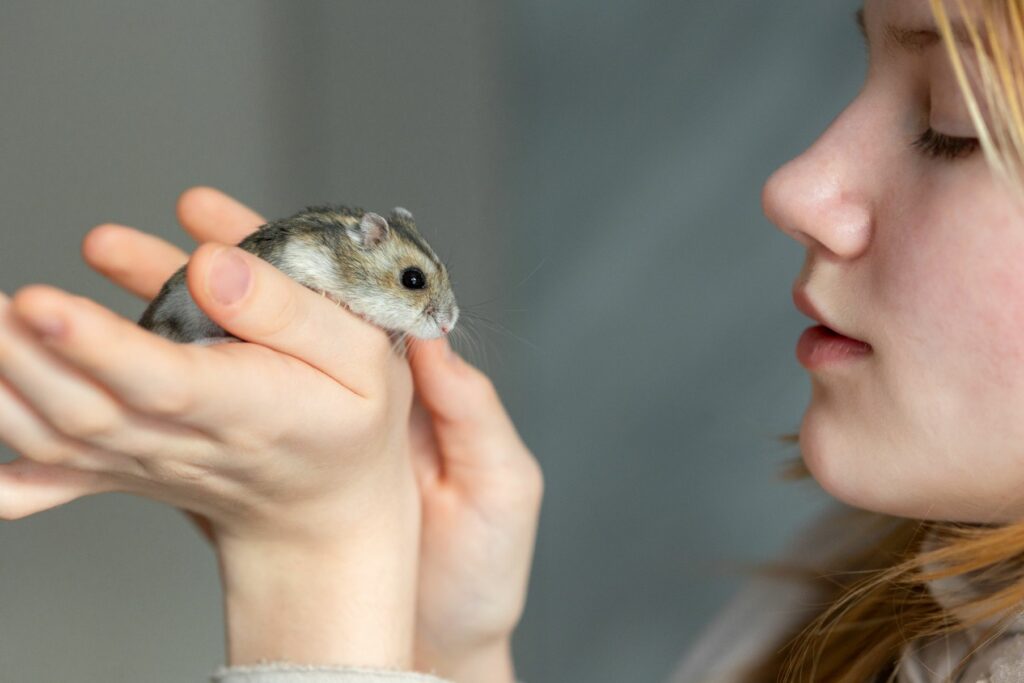Hamsters are cute pets that can provide endless entertainment and joy. However, as a responsible pet owner, it’s important to know the common health issues that a hamster can face. One such issue is hiccups, which can be unsettling to witness. In this blog post, we will discuss the phenomenon of hiccups in hamsters, including their symptoms, causes, diagnosis, treatment, prevention, and when to seek veterinary help.
All hamster species can have hiccups, but luckily, it’s usually not a problem. Keep reading to learn everything you need to know about this phenomenom.

What are hiccups in hamsters?
Definition
Hiccups are involuntary contractions of the diaphragm, which is the muscle that separates the chest from the abdomen. These contractions cause a sudden intake of air into the lungs, followed by a snapping shut of the vocal cords, resulting in the “hic” sound that we are all familiar with.
Symptoms of hiccups in hamsters
The symptoms of hiccups in hamsters are similar to those in humans. You may notice your hamster making a series of short, sharp sounds, which can be accompanied by a jerky movement of their body. They may also exhibit other signs such as: – Rapid breathing – Restlessness – Refusal to eat or drink – General discomfort
Causes of hiccups in hamsters
Hiccups in hamsters can be caused by a variety of factors. The most common causes include:
- Stress or excitement
- Overeating or eating too quickly
- Drinking too much water too quickly
- Cold temperatures
- Respiratory infections
- Gastrointestinal problems
- Allergies or irritants in the environment
- Digestive tract blockages
Duration of hiccups in hamsters
The duration of hiccups in hamsters can vary depending on the cause. In most cases, hiccups will last for a few minutes before subsiding on their own. However, if hiccups persist for a longer period of time, it may be a sign of an underlying health issue.
Diagnosing hiccups in hamsters
When to worry about hiccups in hamsters?
In general, hiccups in hamsters are not a cause for concern and will resolve on their own. However, if your hamster experiences hiccups that last for an extended period of time or are accompanied by other symptoms such as difficulty breathing, coughing, or wheezing, it is important to seek veterinary help immediately. These symptoms may be indicative of a more serious health issue that requires prompt attention.
How to diagnose hiccups in hamsters?
Diagnosing hiccups in hamsters can be challenging as there are no specific tests that can be conducted to confirm the presence of hiccups. However, a veterinary professional will conduct a physical examination of your hamster to rule out any underlying health issues that may be causing the hiccups. Additionally, they may ask about your hamster’s diet, living conditions, and behavior to help identify potential triggers.
Treating hiccups in hamsters
Home remedies for hiccups in hamsters
In most cases, hiccups in hamsters will resolve on their own and do not require any treatment. However, there are a few home remedies that you can try to help your hamster alleviate hiccups: – Gently massage your hamster’s abdomen to help relax their diaphragm – Offer your hamster a small amount of water or food to help them swallow and reset their breathing pattern – Keep your hamster warm and comfortable to help reduce stress and anxiety
Medications for hiccups in hamsters
There are no specific medications that are used to treat hiccups in hamsters. However, if your hamster is experiencing hiccups as a result of an underlying health issue such as a respiratory infection or digestive tract blockage, your veterinarian may prescribe antibiotics or other medications to address the root cause of the hiccups.
Preventing hiccups in hamsters
Preventive measures for hiccups in hamsters
There are several measures that you can take to prevent hiccups in hamsters, including: – Providing a balanced and appropriate diet for your hamster – Ensuring that your hamster has access to clean and fresh water at all times – Keeping your hamster’s living environment clean and free of irritants – Minimizing stress and providing opportunities for exercise and play – Monitoring your hamster’s behavior and seeking veterinary help immediately if you notice any changes or abnormal symptoms
When to seek veterinary help for hiccups in hamsters
As mentioned earlier, hiccups in hamsters are generally not a cause for concern and will resolve on their own. However, if your hamster experiences hiccups that persist for an extended period of time or are accompanied by other symptoms such as difficulty breathing, coughing, or wheezing, it is important to seek veterinary help immediately.
Conclusion
Hiccups in hamsters are a common occurrence that can be caused by a variety of factors. While hiccups are generally not a cause for concern and will resolve on their own, it is important to monitor your hamster’s behavior and seek veterinary help immediately if you notice any changes or abnormal symptoms. By providing a balanced diet, a clean living environment, and minimizing stress, you can help prevent hiccups in hamsters and ensure that your furry friend stays happy and healthy.
- How Long Do American Eskimo Dogs Live? Important Factors and Care Tips - September 29, 2023
- Do American Bulldogs Need Grooming? Essential Tips and Care Guidelines - September 29, 2023
- Do Bengal Cats Enjoy Playing? Essential Tips for Keeping Them Active - September 29, 2023